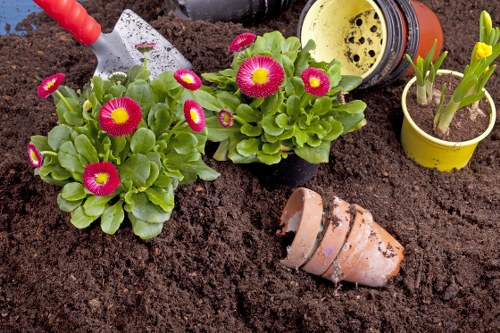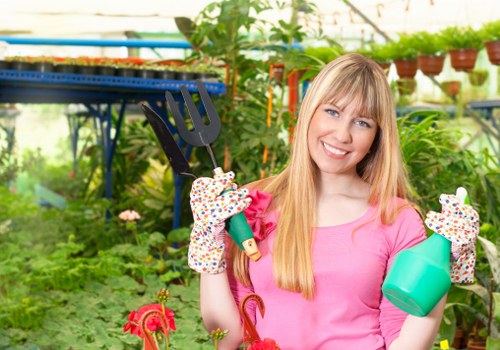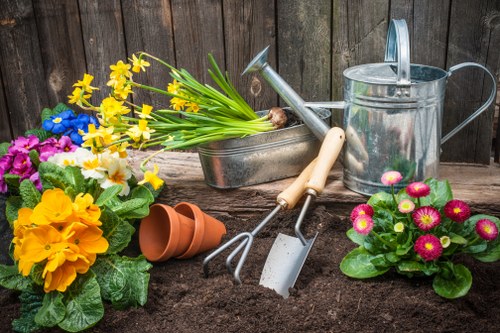Transforming Spaces: Landscape Gardening in Notting Hill
Introduction to Landscape Gardening in Notting Hill

Notting Hill, renowned for its vibrant culture and picturesque streets, offers a unique canvas for landscape gardening. Whether you're a seasoned gardener or a novice, transforming your outdoor space in this iconic London neighborhood can enhance both aesthetic appeal and property value.
Embracing the essence of Notting Hill's charm involves blending traditional gardening techniques with modern design elements. This fusion creates harmonious environments that reflect the area's eclectic spirit.
In this article, we'll explore the key aspects of landscape gardening in Notting Hill, from selecting the right plants to designing functional outdoor spaces that complement the local architecture.
Understanding the Climate and Soil of Notting Hill

The success of any landscape gardening project hinges on understanding the local climate and soil conditions. Notting Hill experiences a temperate maritime climate, characterized by mild winters and cool summers. This climate is conducive to a wide variety of plants, making it an ideal location for diverse gardening endeavors.
The soil in Notting Hill is predominantly clay-based, which retains moisture effectively but can pose drainage challenges. To address this, incorporating organic matter such as compost can improve soil structure, enhancing aeration and nutrient availability for plants.
Additionally, conducting a soil test before commencing your gardening project can provide valuable insights into pH levels and nutrient content, guiding your plant selection and soil amendment strategies.
Choosing the Right Plants for Notting Hill Gardens

Selecting appropriate plants is crucial for creating a thriving garden in Notting Hill. Opting for native and resilient species ensures better adaptability to the local environment, reducing maintenance efforts.
Perennials and Annuals
Incorporate a mix of perennials and annuals to achieve year-round interest. Perennials like lavender and hostas provide consistent foliage and blooms, while annuals such as petunias and marigolds add vibrant seasonal color.
Shade and Sun-Loving Plants
Evaluate the sunlight exposure in your garden spaces. Shade-tolerant plants like ferns and impatiens thrive under canopies, whereas sun-loving varieties like geraniums and daisies flourish in open areas.
- Lavender: Offers fragrance and attracts pollinators.
- Hostas: Provide lush greenery for shaded regions.
- Petunias: Add bright, seasonal hues.
- Geraniums: Perfect for sunny spots with their vivid flowers.
By carefully selecting plants suited to the specific conditions of your Notting Hill garden, you can create a vibrant and sustainable outdoor space.
Designing Functional Outdoor Spaces

Effective landscape gardening involves thoughtful planning to design spaces that are both beautiful and functional. Consider the various purposes your garden will serve, such as relaxation, entertainment, or play areas for children.
Patio and Seating Areas
Integrate comfortable seating areas where you can unwind or entertain guests. Using materials like natural stone or reclaimed wood can add a rustic charm that complements Notting Hill's aesthetic.
Pathways and Walkways
Creating well-defined pathways enhances the flow of your garden. Whether it's a winding stone path or a modern concrete walkway, clear pathways guide movement and add structure to your outdoor space.
- Define Zones: Separate different functional areas for clarity and organization.
- Incorporate Lighting: Use outdoor lighting to illuminate paths and highlight key garden features.
- Use Natural Materials: Opt for materials that blend seamlessly with the garden's natural elements.
By designing with functionality in mind, your Notting Hill garden can serve as a versatile extension of your living space.
Incorporating Sustainable Practices

Sustainability is a vital aspect of modern landscape gardening. Implementing eco-friendly practices not only benefits the environment but also creates a resilient garden that thrives with minimal intervention.
Rainwater Harvesting
Collecting and utilizing rainwater for irrigation reduces reliance on municipal water supplies. Installing rain barrels or a rainwater harvesting system can provide a sustainable water source for your plants.
Composting
Composting organic waste transforms kitchen scraps and garden debris into nutrient-rich soil amendments. This practice enriches the soil and promotes healthy plant growth.
- Reduce Waste: Minimize landfill contributions by recycling organic materials.
- Enhance Soil Health: Compost improves soil structure and fertility.
- Promote Biodiversity: Healthy soil supports a diverse range of microorganisms and insects.
Embracing sustainable gardening practices ensures that your Notting Hill garden remains vibrant and environmentally responsible for years to come.
Choosing the Right Garden Structures

Integrating garden structures such as pergolas, arbors, and raised beds can enhance both the functionality and visual appeal of your landscape. These elements provide support for climbing plants, create shaded areas, and define specific garden sections.
Pergolas and Arbors
These structures offer vertical support for vines and climbers, adding depth and height to your garden design. They also provide shaded pathways and seating areas, making your outdoor space more comfortable during sunny days.
Raised Beds
Raised beds improve soil drainage and allow for better control over soil quality. They are ideal for growing vegetables, herbs, and flowering plants, making them a practical addition to any garden.
- Define Boundaries: Use structures to delineate different garden areas.
- Add Vertical Interest: Structures like trellises and pergolas create visual intrigue.
- Enhance Functionality: Provide specific areas for cultivation and relaxation.
By thoughtfully incorporating garden structures, you can elevate the design and utility of your Notting Hill landscape.
Maintaining Your Landscape Garden

Proper maintenance is essential to ensuring your landscape garden remains lush and vibrant throughout the seasons. Regular care practices help prevent issues such as pests, diseases, and plant stress.
Watering and Irrigation
Establish a consistent watering schedule tailored to the needs of your specific plants. Utilizing drip irrigation systems can optimize water usage and reduce waste.
Pruning and Trimming
Regular pruning promotes healthy growth and maintains the desired shape and size of your plants. It’s important to remove dead or diseased foliage to prevent the spread of pests.
- Monitor Plant Health: Regularly inspect plants for signs of stress or infestation.
- Weed Control: Keep garden beds free of weeds to reduce competition for nutrients.
- Fertilization: Apply appropriate fertilizers to support plant growth.
Consistent maintenance practices ensure the longevity and beauty of your landscape garden in Notting Hill.
Integrating Hardscaping Elements

Hardscaping elements like patios, pathways, and water features add structure and functionality to your landscape. These components create focal points and enhance the overall design of your garden.
Patios and Outdoor Kitchens
Creating dedicated outdoor living spaces allows you to enjoy your garden year-round. Outdoor kitchens and dining areas are perfect for entertaining and spending quality time with family and friends.
Water Features
Incorporating fountains, ponds, or waterfalls introduces soothing sounds and visual interest. Water features can serve as centerpieces, attracting wildlife and creating a tranquil ambiance.
- Choose Durable Materials: Select materials that withstand the local climate.
- Ensure Proper Installation: Professional installation ensures longevity and functionality.
- Maintain Regularly: Keep hardscaping elements clean and in good condition.
By thoughtfully integrating hardscaping elements, you can elevate the functionality and aesthetics of your Notting Hill garden.
Seasonal Planting and Color Schemes

Implementing seasonal planting strategies ensures that your garden remains vibrant throughout the year. By selecting plants that bloom in different seasons, you can maintain a dynamic and colorful landscape.
Spring:
Plant bulbs like tulips and daffodils to herald the arrival of spring. Early blooming herbs and perennials add fresh color and texture.
Summer:
Incorporate heat-tolerant species such as sunflowers and lantanas. Tropical plants can add an exotic flair during the warmer months.
- Autumn: Choose plants with rich foliage colors like maples and asters.
- Winter: Opt for evergreens and plants with interesting bark or berry structures to maintain garden interest.
Carefully planning your planting schedule and color schemes keeps your Notting Hill garden engaging and delightful all year long.
Incorporating Local Architecture into Garden Design

Notting Hill's unique architectural styles, from Victorian terraces to modern townhouses, provide inspiration for landscape gardening. Harmonizing garden design with the surrounding buildings enhances the overall appeal of your property.
Victorian Gardens:
Embrace classic elements like ornate fences, topiary plants, and symmetrical layouts. Rich textures and layered plantings add depth and sophistication.
Modern Gardens:
Opt for minimalist designs with clean lines and geometric shapes. Use contemporary materials like metal and concrete to complement sleek architectural features.
- Match Architectural Styles: Ensure your garden complements the design of your home.
- Use Cohesive Materials: Select garden elements that echo the materials used in your building.
- Balance Proportions: Scale garden features to maintain harmony with the structure of your property.
By integrating local architectural elements into your garden design, you create a seamless and visually appealing outdoor space that reflects the character of Notting Hill.
Enhancing Privacy and Security

Creating a sense of privacy in your landscape garden allows you to enjoy your outdoor space without interruptions. Additionally, implementing security measures ensures a safe and serene environment.
Privacy Screening:
Use hedges, fences, or trellises with climbing plants to create natural barriers. These elements provide privacy while adding greenery and structure to your garden.
Lighting for Security:
Strategically placed outdoor lighting deters intruders and enhances safety. Motion-sensor lights are particularly effective in illuminating key areas without excessive energy usage.
- Natural Barriers: Plant dense foliage to block unwanted views.
- Secure Fencing: Install sturdy fences that complement your garden's design.
- Outdoor Lighting: Illuminate pathways and entry points to increase visibility.
By prioritizing privacy and security, your Notting Hill landscape garden becomes a safe and exclusive retreat.
Integrating Technology in Landscape Gardening

Modern technology offers innovative solutions to enhance and simplify landscape gardening. Integrating smart systems can optimize maintenance and improve the overall garden experience.
Smart Irrigation Systems
Automated irrigation systems adjust watering schedules based on weather conditions, ensuring plants receive the right amount of moisture without manual intervention.
Garden Automation
Automate tasks like lighting control and climate regulation to create a more manageable and efficient garden space.
- Remote Monitoring: Use mobile apps to monitor and control garden systems from anywhere.
- Energy Efficiency: Implement solar-powered lighting and energy-saving devices.
- Integration with Smart Home Systems: Seamlessly connect garden technology with your existing smart home infrastructure.
By embracing technology, you can create a modern and efficient landscape garden that meets your lifestyle needs in Notting Hill.
Seasonal Maintenance Tips

Effective landscape gardening requires adapting maintenance practices to the changing seasons. Implementing seasonal tips ensures your garden remains healthy and attractive throughout the year.
Spring:
Prepare your garden by clearing debris, pruning shrubs, and fertilizing plants. Plant new seeds or seedlings to jumpstart the growing season.
Summer:
Focus on regular watering, especially during dry spells. Mulch garden beds to retain moisture and suppress weeds.
- Autumn: Rake fallen leaves, plant bulbs for spring, and protect sensitive plants from early frosts.
- Winter: Prune trees and shrubs, protect plants from harsh weather, and plan for the upcoming year.
Adapting your maintenance routine to each season keeps your Notting Hill landscape garden thriving and resilient.
Local Regulations and Community Guidelines

When undertaking landscape gardening in Notting Hill, it's essential to be aware of local regulations and community guidelines. Adhering to these rules ensures your garden project complies with city standards and maintains neighborhood harmony.
Planning Permissions:
For extensive modifications like large structures or significant changes to property boundaries, obtaining planning permission may be necessary. Consult local authorities to understand the requirements before commencing your project.
Homeowner Association Rules:
If your property is part of a homeowner association (HOA), review their landscaping guidelines. These rules may dictate aspects like plant types, fence heights, and overall garden aesthetics.
- Research Local Regulations: Familiarize yourself with Notting Hill's specific gardening laws.
- Seek Permissions When Needed: Apply for necessary permits to avoid legal issues.
- Respect Community Standards: Ensure your garden design aligns with neighborhood expectations.
Understanding and complying with local regulations fosters a positive gardening experience and contributes to the overall appeal of Notting Hill.
Hiring Professional Landscape Gardeners in Notting Hill

While DIY gardening can be rewarding, hiring professional landscape gardeners in Notting Hill offers expertise and efficiency that can elevate your garden design and maintenance.
Benefits of Professional Services
Professionals bring a wealth of knowledge in plant selection, garden design, and maintenance best practices. They can transform your vision into reality, ensuring a cohesive and aesthetically pleasing outdoor space.
Choosing the Right Gardener
When selecting a landscape gardener, consider their experience, portfolio, and client reviews. A reputable gardener will understand your needs and provide tailored solutions that align with your garden goals.
- Check Credentials: Ensure the gardener is certified and has relevant experience.
- Review Portfolios: Look for examples of past projects similar to your vision.
- Seek Recommendations: Ask for referrals from friends or neighbors in Notting Hill.
Investing in professional landscape gardening services can save time, reduce stress, and produce stunning results in your Notting Hill garden.
Conclusion: Creating Your Dream Landscape Garden

Embarking on a landscape gardening journey in Notting Hill offers the opportunity to create a personalized and enchanting outdoor space. By understanding the local climate, selecting appropriate plants, designing functional areas, and incorporating sustainable practices, you can cultivate a garden that thrives year-round.
Whether you choose to undertake the project yourself or enlist the help of professional gardeners, careful planning and attention to detail are key to success. Embrace the vibrant spirit of Notting Hill and transform your garden into a stunning sanctuary within this beloved London neighborhood.
Ready to transform your outdoor space? Contact us today to book your landscape gardening service in Notting Hill and bring your garden dreams to life!
